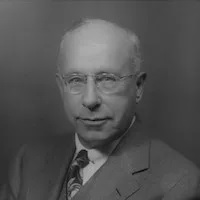Chester Barnard
| Chester Irving Barnard | |
|---|---|
 |
|
| Born | November 7, 1886 Malden, Massachusetts |
| Died | June 7, 1961 New York City |
| Residence | United States |
| Citizenship | American |
| Fields | organizational theory |
| Known for | The Functions of the Executive (1938) |
| Influences | Max Weber, Kurt Lewin, Vilfredo Pareto |
| Influenced | Herbert Simon, Oliver E. Williamson |
Chester Irving Barnard (November 7, 1886 – June 7, 1961) was an American business executive, public administrator, and the author of pioneering work in management theory and organizational studies. His landmark 1938 book, The Functions of the Executive, sets out a theory of organization and of the functions of executives in organizations. The book has been widely assigned in university courses in management theory and organizational sociology. Barnard viewed organizations as systems of cooperation of human activity, and noted that they are typically short-lived. According to Barnard, organizations are generally not long-lived because they do not meet the two criteria necessary for survival: effectiveness and efficiency.
In his youth, Barnard worked on a farm, then studied economics at Harvard University, earning money selling pianos and operating a dance band. He did not obtain his Harvard BA because he did his four-year work in three years and could not complete a science course, but a number of universities later granted him honorary doctorates.
Barnard joined the American Telephone and Telegraph Company (now AT&T) in 1909. In 1927, he became president of the New Jersey Bell Telephone Company. During the Great Depression, he directed the New Jersey state relief system.
He was elected a Fellow of the American Academy of Arts and Sciences in 1939. He was president of the United Service Organizations (USO), 1942-45. Upon retiring from business, he served as president of the Rockefeller Foundation, 1948–52, and as chairman of the National Science Foundation, 1952-54. End 1950s he was among the first members of the Society for General Systems Research.
...
Wikipedia
